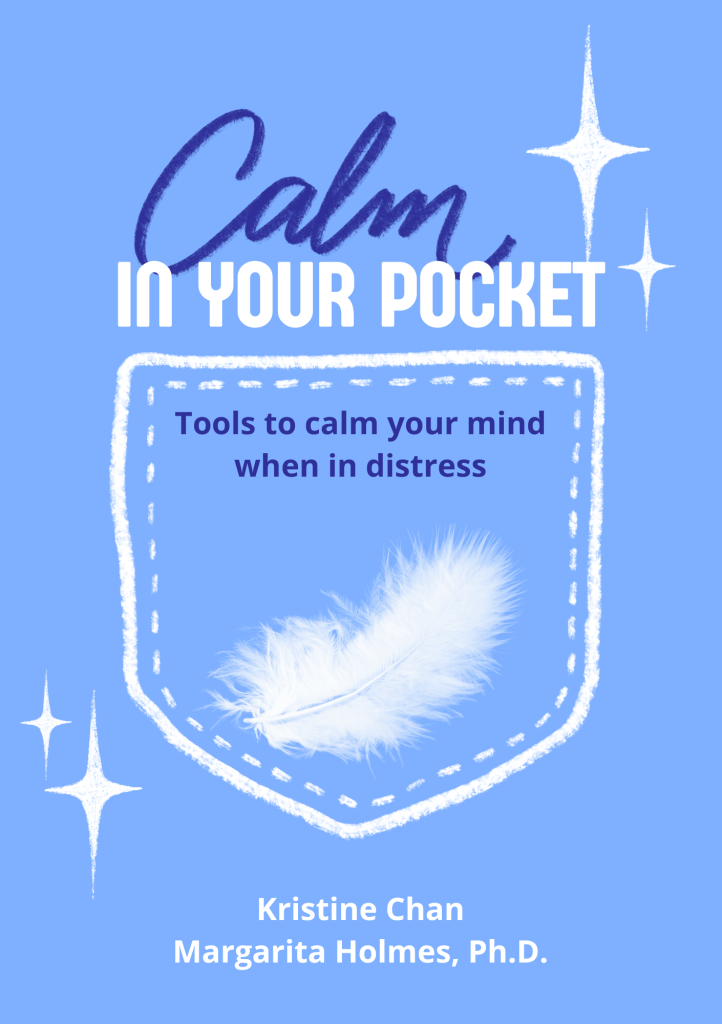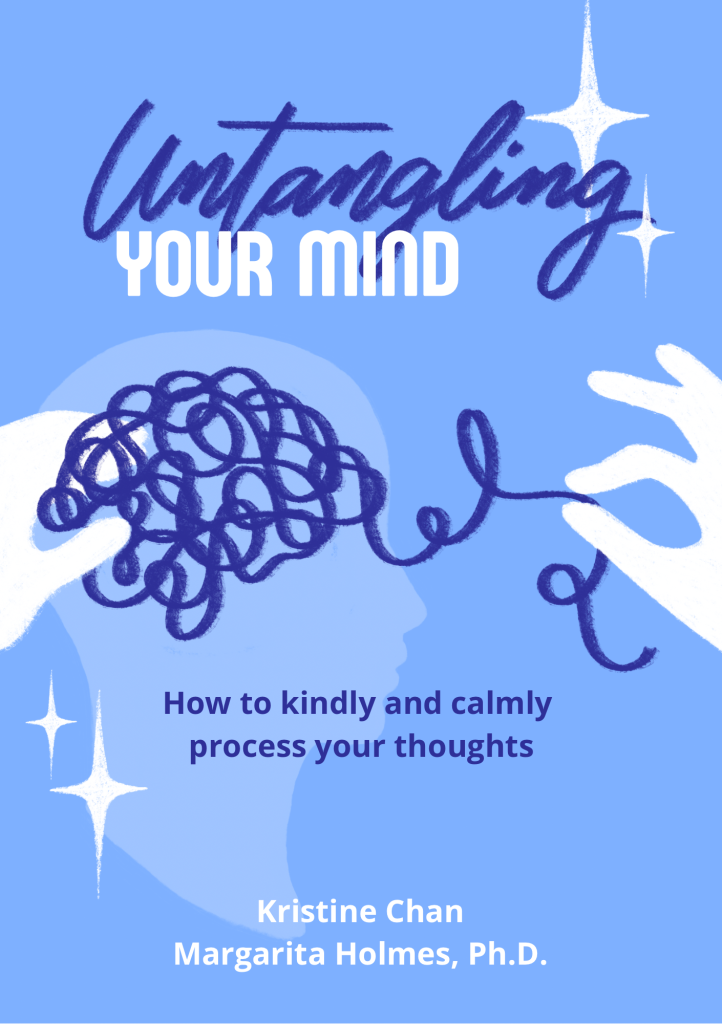
After hosting several story-sharing sessions such as Conversations and Clay, we noticed that lot of Filipinos experience trauma in different ways. We wanted to provide participants with secular and humanist care that they can bring home and use to help calm down and process their thoughts. These workbooks contain some evidence-based techniques that anyone can try and use to see if it works for them. We hope to also help any freethinkers, humanists, and non-religious people when they’re in distress or anxious. These workbooks were written by Kristine Chan and Margarita Holmes, PhD with the support of the Embassy of the Kingdom of the Netherlands.
Please send us any feedback about the workbooks: https://filipinofreethinkers.org/mh-feedback/

Hello, friend! Let’s get calm.
This workbook, Calm in Your Pocket, is here to help you acquire tools to calm your mind, especially in a world that often ignores, dismisses, or trivializes our mental health needs. We live in a world where we need to fight for our basic human rights. This can often leave us feeling angry, anxious, powerless, and like nothing will ever change.
This workbook isn’t about solving those big, systemic issues right away. Before you can effectively process your feelings, figure out what’s in your power to change, or decide where to put your precious energy, you need to find a place of inner calm.
Our immediate goal, with these techniques, is simple: to help you feel less anxious, less angry, less sad, and less frustrated. It’s about finding that steady ground so you can breathe, think, and eventually, move forward with more clarity and strength.
Your body’s inner pilot: the Autonomic Nervous System
Your body has this incredible, inner pilot called the Autonomic Nervous System (ANS). Think of it as the network of nerves that silently handles all your unconscious, “autopilot” tasks. It handles everything from your breathing and heart rate, to digesting your lunch, and how your body responds when you hear music.
The ANS has two main branches, each with very distinct jobs: the Sympathetic Nervous System (SNS) and the Parasympathetic Nervous System (PSNS). When you’re facing stress, danger, or even just something that gets your adrenaline pumping, the SNS kicks in. It prepares your body for intense physical activity, enabling you to respond to a threat. The SNS is responsible for the four responses when you’re under pressure: fight, flight, freeze, or fawn.
On the flip side, we have the PSNS, your body’s built-in regenerative system. It is designed to counteract stress and bring things back to normal. It’s responsible for promoting calmness, relaxation, and helping your body conserve and restore energy.
All the techniques in this workbook are specifically designed to gently nudge and activate your PSNS. Since stress is primarily activated by the SNS, we definitely need the PSNS to step in and counterbalance its effects, helping you dial down the distress.
15 ways to calm
We’ve prepared a variety of techniques that you can put in your pocket to help. They can help in immediately minimizing pain and emotional distress when you find yourself in a state of heightened anxiety, anger, or frustration.
We hope all of them are easy to follow, so you can pick and choose what works for you anytime you need them. You can do one or as many as you need, even several times a day. Make sure you find a safe and comfortable space and position where you can relax and feel secure before starting on any of the techniques. Try to observe and examine your feelings, emotions, and thoughts before and after following the technique to see which ones are more helpful for you and which you enjoy doing!
This list is not meant to be comprehensive. If we list everything, it won’t fit in your pocket! However, we compiled a list of techniques that have most helped us and have a scientific basis. If you would like to learn more about the techniques, we have also provided references for you to study the methods in more detail.
Good luck and hang in there!
Read more content and check the references of these excerpts by downloading the workbooks:
Please send us any feedback about the workbooks: https://filipinofreethinkers.org/mh-feedback/

Hello, friend! Let’s start untangling.
This second workbook, Untangling Your Mind, provides tools to process your thoughts kindly and calmly. This is meant to be explored after you’ve finished the Calm in Your Pocket workbook. When we are calm and not overwhelmed by distress, we can examine our thoughts more objectively. This enables us to see how our thoughts, which we usually think are helpful, may even contribute to the problem.
The exercises in this workbook will give you valuable skills:
- to be more mindful about your own thinking
- to identify thoughts that lead to negative emotions
- to observe your thoughts kindly and without judgment
- to turn unhelpful thoughts into something more beneficial
We draw on insights from various sources and themes:
- Cognitive Behavioral Therapy
- Dialectical Behavior Therapy
- Stoicism
- Self-compassion
The information and advice found here is not intended to be comprehensive, but rather a good starting point. If you would like to learn more, we have provided references at the end of each section.
A few things to remember
This workbook is organized into sections that take you through a sequential process. It is best to read the workbook in the order it is written.
Please be aware that some sensitive or upsetting topics may arise. If you feel stressed or anxious at any point, feel free to take a break and revisit the Calm in Your Pocket workbook. Return here to process your thoughts when in a calmer state. There is no need to hurry. The pace is entirely up to you. For example, you can set a goal to answer one or two questions, or set a time to think about one question (say 5 – 10 minutes), or just do whatever feels right (some questions may be easier than others).
Before we begin to untangle your thoughts, let’s talk about your overall well-being. It will be hard for your mind to find peace and clarity if your body’s basic needs are not being met. Below are some areas that you can check or improve on as you untangle your thoughts:
- Sleep
- Nutrition
- Exercise
- Relationships
- Stress
As you go through this workbook, always remember to be gentle and kind to yourself. Anyone can have thoughts that are different, unrealistic, or unhelpful. They don’t make you bad or make your emotions invalid. Your thoughts can also be fleeting and change over time. Lastly, try to answer the questions bravely, honestly – you’re the only one who will read what you write (unless you want to share with someone you trust).
Good luck and hang in there!
Read more content and check the references of these excerpts by downloading the workbooks:
Please send us any feedback about the workbooks: https://filipinofreethinkers.org/mh-feedback/

